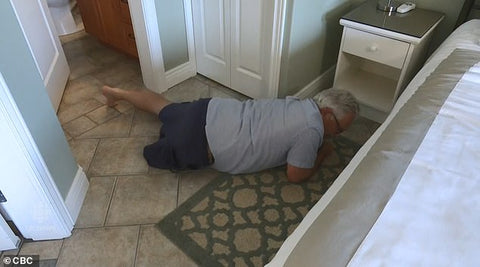Agents at Calgary Airport and United Airlines Refused Amputee's Lithium Battery for Scooter

Stearn Hodge lost his right leg and left arm in a workplace accident in 1984. Due to the risk of infection, he can not wear or use his prosthetic legs for long periods of time. So he uses a scooter powered by lithium batteries.
When Stearn tried to get on his flight from Calgary Airport, Canada, to Tulsa, Oklahoma, for a holiday to celebrate his 43th wedding anniversary with wife Jan, he was told the batteries were not allowed on board the plane by a security agent at the Calgary International Airport and a representative from United Airlines.
However, that is WRONG. Stearn Hodge's battery was allowed as long as he brought it onto the plane as a carry on.
The agent with the Canadian Air Transport Security Authority (CATSA) and a United Airlines official cited fire safety concerns over the potentially volatile batteries - even though the Hodges had secured the required written permission from the airline beforehand.
While lithium-ion batteries are a potential fire hazard, global standards issued by the International Air Transport Association (IATA) allow people with disabilities to travel with compact lithium batteries for medical devices in carry-on luggage.
Hodge said that neither CATSA or United Airlines officials would listen to or read his written approval from the airline and his IATA documents in support.
Unable to move around without his scooter when they got to their hotel, Hodge was forced to crawl on the floor in front of his wife to use the bathroom.

He spent much of the holiday in bed - something he described as "the most humiliating experience I can think of."
Now the former contractor wants his case heard by the Canadian Human Rights Commission, and told CBA: "It unmasks how real my disability is… I haven't been the same since."
To add further insult, after being told he couldn't bring his batteries on board, a CATSA agent suggested he get a wheelchair instead.
"How's a one-armed guy going to run a wheelchair? How am I going to go down a ramp and brake with one hand? But that shouldn't even have to come up," he said.
Hodge's wife Jan had recently undergone cancer treatment, which affected her spine, meaning she couldn't push a wheelchair for her husband either.
In an email sent to Hodge by a United Airlines complaint resolution official, they said: "it appears we were in violation of federal disability requirements," and offered an $800 travel certificate and apologized for the "inconvenience."
"Inconvenience is when it rains on your holiday," said Hodge. "This was a… life-changing moment for me and my wife."
On May 9, Hodge's lawyer, John Burns, will ask a Federal Court judge to compel the commission to hear the case.
"It's a failure of the Canadian Human Rights Commission to grant access to the remedy that the statute provides," said Burns.
The Canadian Human Rights Act allows for up to $20,000 in damages for each count of pain and suffering, with a further maximum of $20,000 if the discrimination is 'willful or reckless.'
Please do your due diligence in making sure your product and battery are allowed. Something Mr. Hodges did. We urge anyone flying with a mobility device with a litium battery that are allowed on a commercial airplane to not let airport security or airline representatives to refuse your device or battery. Know your rights!
